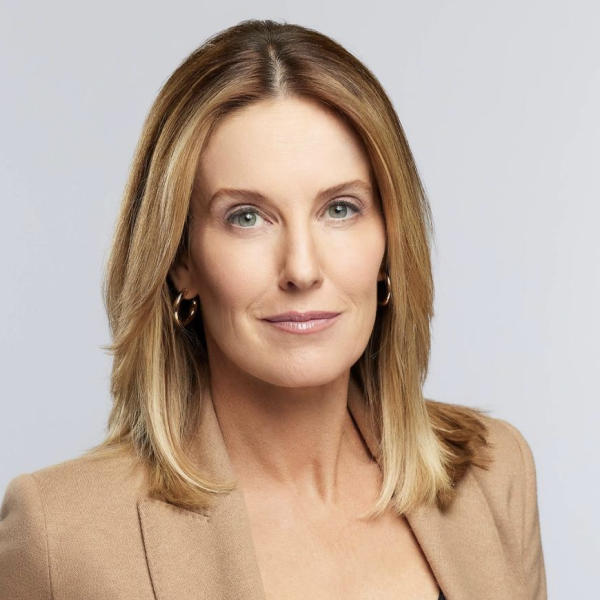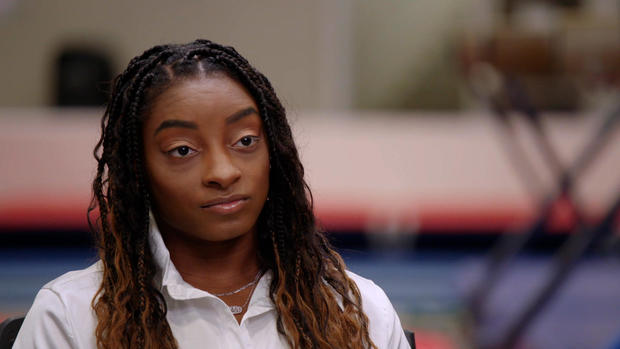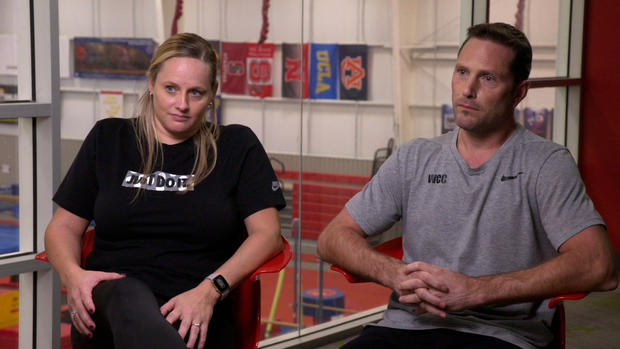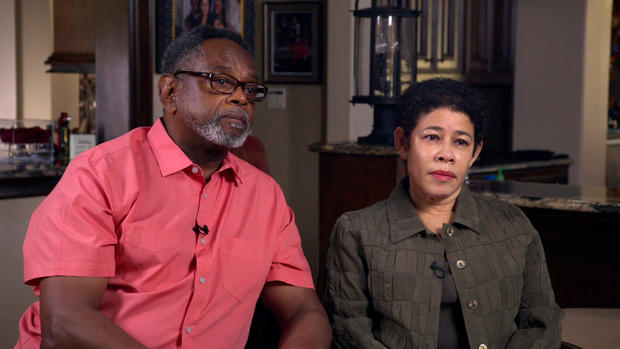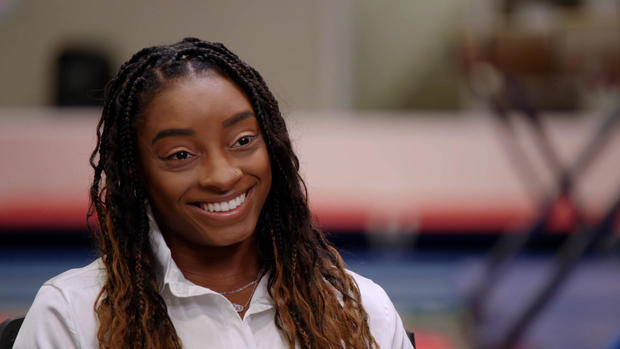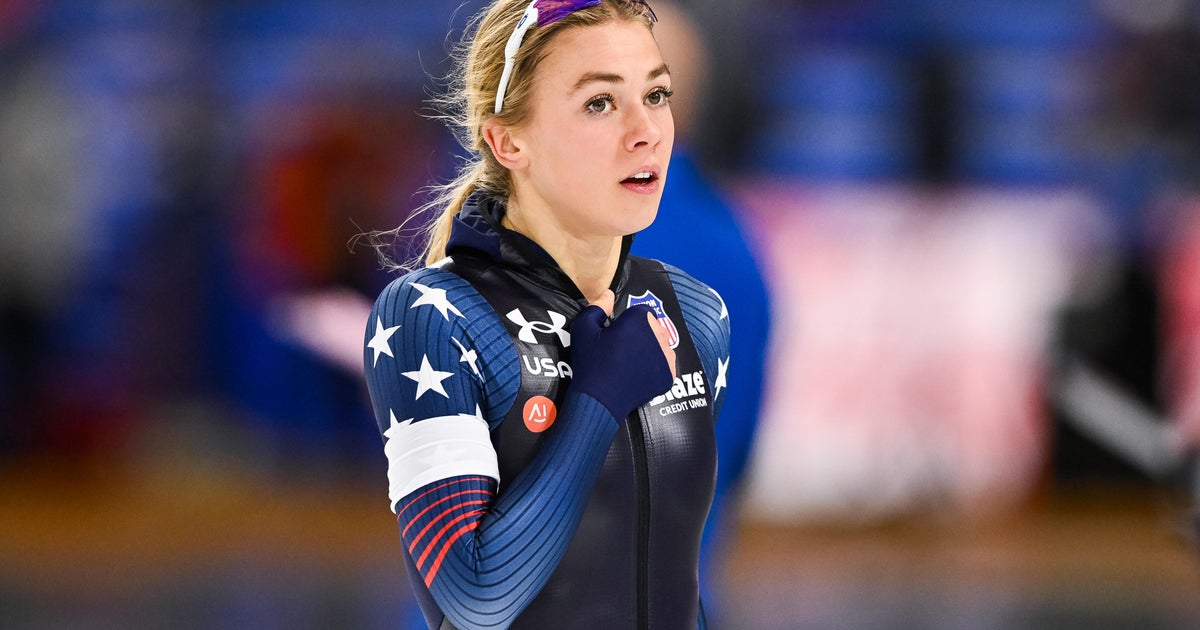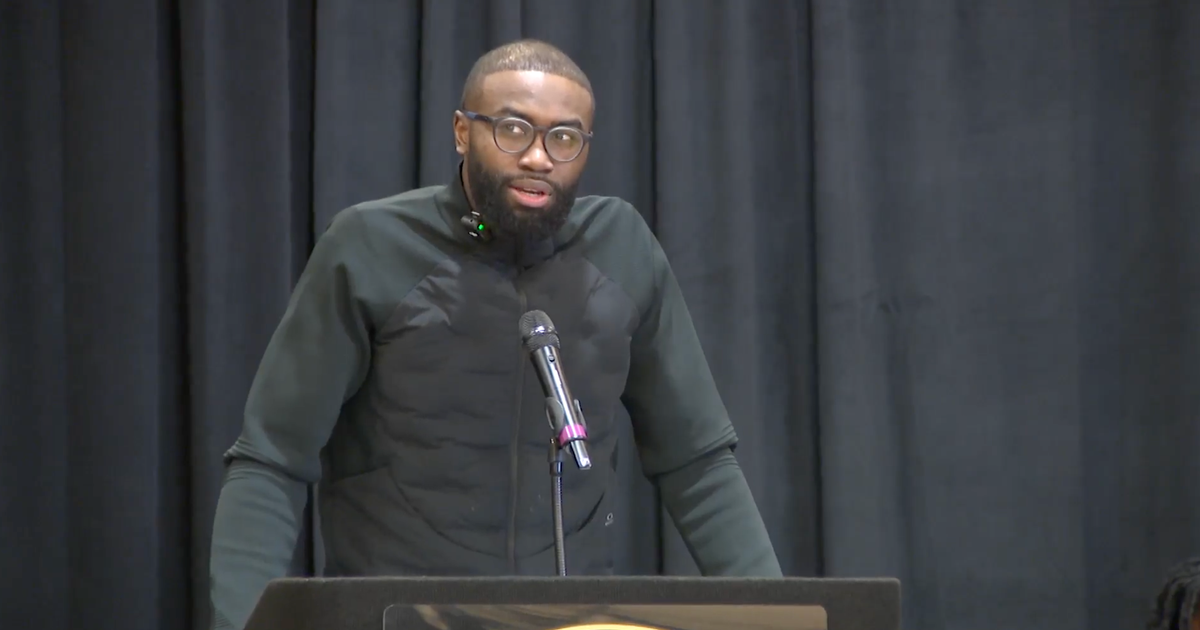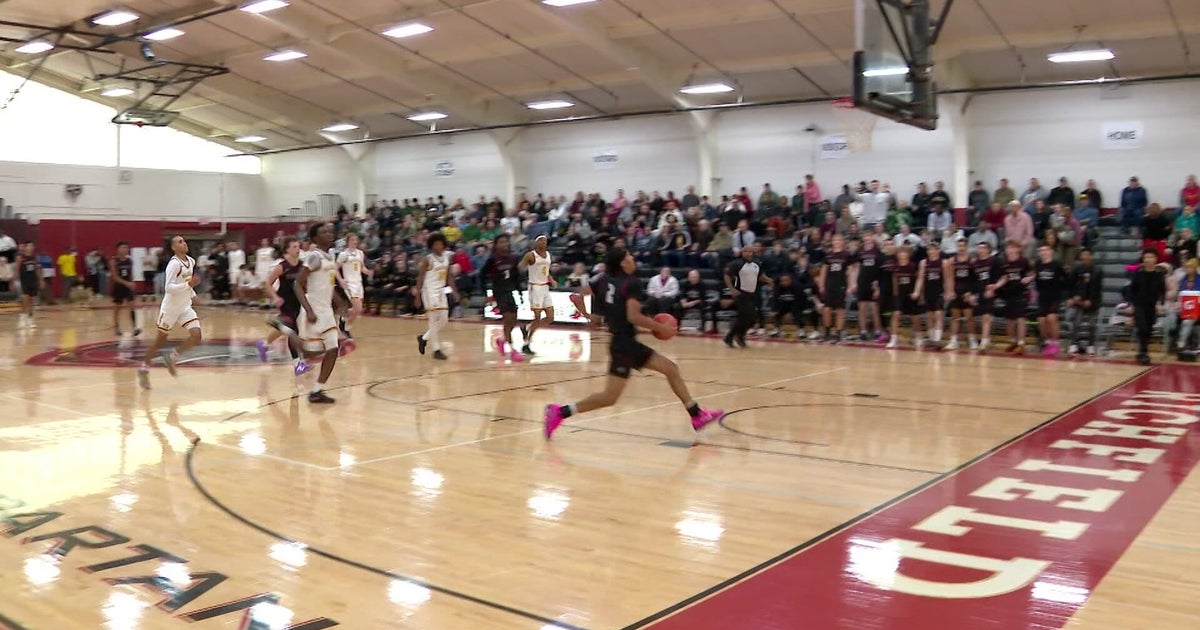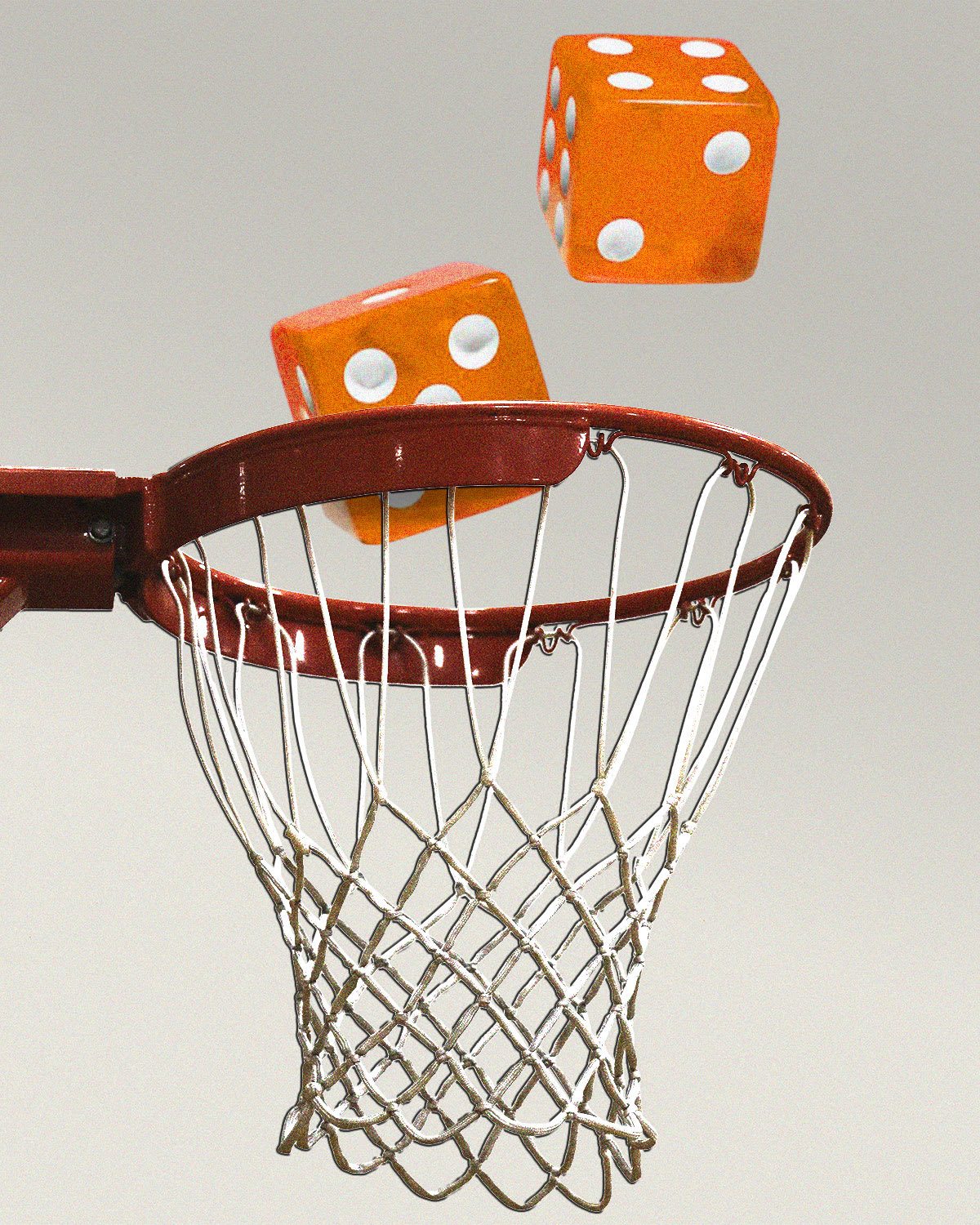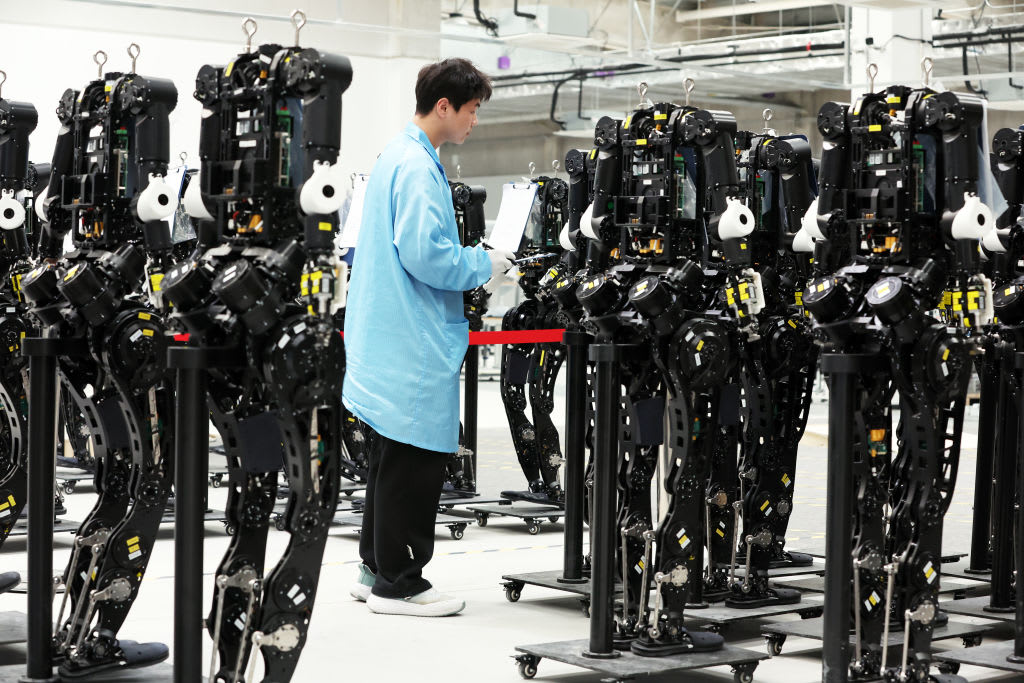Simone Biles readies for her final Olympics
Simone Biles is one of the most dominant athletes in the world. If that sounds like hyperbole, just listen to this. She hasn't lost a gymnastics all-around competition in eight years and in a sport where the top contenders are usually separated by mere decimal points, she wins by whole numbers. She also owns the most Olympic and World Championship gold medals combined of any gymnast in history. Biles had hoped to crown her career with more Olympic golds last summer and then retire. But when the pandemic postponed the Tokyo Olympics until this July, Biles reluctantly decided to train for another year. If, like most Americans, you only watch gymnastics once every four years during the Olympics, here's a glimpse of what you've missed.
At the 2019 World Championships in Germany, 4'8" Simone Biles stretched the laws of physics.
Simone Biles: I thought I had already maxed out on all the events. So to see what I could do kinda blew my mind.
Sharyn Alfonsi: Do you still surprise yourself?
Simone Biles: Yeah. Sometimes, I still surprise myself.
Sharyn Alfonsi: Like, "I just did that?" (laughter)
Simone Biles: Yes, all the time.
Biles has made a career out of surprising people. She was the first woman to do moves on the floor, vault and beam that are now named after her. Last March, she was ready to push the sport even further.
As the Tokyo Olympics approached, a documentary team from Facebook followed Biles who says she was at her peak and better than ever. She was expected to be the star of the Olympics… then, COVID hit. The Games were postponed. Biles says she was crushed.
Simone Biles: I just sat there and I was like, 'I really don't know how I'm gonna do this. Like, another year out? I don't think it's possible for me at this point mentally.'
Sharyn Alfonsi: Not physically, but mentally?
Simone Biles: Yes. Pushing through those trainings when I had in my mind, "In three months I'll be done," it's like, how do you push back for another year?
Her 50,000-square foot gym in Texas shut down. Biles said she became depressed, slept constantly and wanted to quit.
Simone Biles: We ended up taking seven weeks off.
Sharyn Alfonsi: Had you ever had seven weeks off since you were a little girl?
Simone Biles: No, never in my life.
Sharyn Alfonsi: How did you change your mind?
Simone Biles: It took a little bit of time. But then I talked to my coaches and Cecile especially was like, "You know what, Simone? You've trained so hard for this. Why would you give it up?" And I'm, like, "Yeah, you're right. Like I didn't come this far to only come this far."
We were with her in the fall, as she got back to the grind. By committing to 6 a.m. wakeup calls to start six hours of training, six days a week, Biles knew she was taking a risk. There is no guarantee the Olympics will take place this summer. Tokyo is under a state of emergency and hosting 11,000 athletes from 200 countries in a pandemic is daunting. Then there's Biles' age. Female gymnasts typically peak as teenagers, Biles is 23. The way she bounds into the air and pounds onto the mat, the threat of an injury is always lurking.
Sharyn Alfonsi: As you are back in the gym, pushing it every day, do you worry about your physical health?
Simone Biles: Sometimes I do but I just know that I need to do more therapy and take better care of my body, just because I'm older.
Sharyn Alfonsi: Cause you're the ripe age of 23?
Simone Biles: Yes (laugh).
Sharyn Alfonsi: Which in a gymnast is, like, what? Like?
Simone Biles: Ancient (laugh). It's pretty old.
Sharyn Alfonsi: What do you do to get ready to train twice a day?
Simone Biles: Get up, go, roll out, stretch before we stretch, because I'm that old (laughs).
Sharyn Alfonsi: Wait, you stretch before you stretch…
Simone Biles: Yeah, (laughs) I have to stretch before I stretch.
Simone Biles could win at this summer's Olympics if she relied on her old skills, but she has other plans that seem to defy gravity and good sense.
At her gym, we found Biles working on something that turned our heads. It's called a Yurchenko double pike. Difficult name, difficult move.
Laurent Landi: It's very, very challenging. And what's scary, it's that people can get hurt, you know? You do a short landing, you can hurt your ankles, and then-- you know-- it's-- it's a very dangerous vault.
Biles's new coaches, the French husband and wife team of Laurent and Cecile Landi, say Biles could be the first woman to attempt this double pike in competition. Only men have landed it.
Sharyn Alfonsi: How do you make the decision not to just play it safe?
Laurent Landi: I think it will become very, very boring for everybody.
Cecile Landi: I think she's opened the eyes to everybody that this can be done, when I think a lot of people believed that a female could not do it.
The Landis say Biles is built perfectly for the sport. First, she has explosive speed. There is so much power in her run she can fit in more skills and pile up more points. Launching herself twice the height of her frame, it looks like a blur. But slow down the video and you can appreciate the control: one… two… three twists with a double backflip. And her coaches say she was born with another skill that's hard to teach: air awareness.
Simone Biles: Air awareness is knowing where you are in the air. Most of the time, honestly, I think my eyes go shut.
Sharyn Alfonsi: Oh really?
Simone Biles: It just feels like the room is spinning. Like, if you take a globe and you spin it, it goes so fast you can't really see, and that's how it feels. But I don't crash much, or like ever.
No one ever dreamed Biles would reach such great heights when she was a small child in Columbus, Ohio, living with a single mother who was struggling with addiction.
Simone Biles: I remember we didn't really have a lot of food. We were always hungry. And we went to, like, my Uncle Danny's house. And they gave us cereal. But we didn't have any milk, couldn't afford milk. So we just put water in it. And he was like, 'Look, it's the same thing.' And we were like, 'Nope, it's not, but okay nice try.'
Social services took Simone and her siblings away from their mother and placed them in foster care. Simone's maternal grandfather Ron Biles and his wife Nellie were living outside Houston at the time.
Ron Biles: I got a call from the social worker, said the kids were in foster care. I wasn't aware that it was that bad. I mean, just the thought of them being in foster care it just sounded so bad, and at that time we had the ability to take care of them. So, 'Send them to me.'
Simone and her sister, Adria, were eventually adopted by their grandpa Ron and grandma Nellie.
Simone Biles: They were like, 'You guys can call us Mom and Dad if you want.' And I remember going upstairs and practicing. And then ran down and I was like, 'Mom? Dad?'
Sharyn Alfonsi: I mean, you hit the lottery with these two, right?
Simone Biles: Yeah, I did. I'm, I was very blessed.
Seeing Simone somersaulting around their living room, her new parents put her in gymnastics out of self preservation. Simone was tiny and a little wobbly at first, but she was fearless. By the time she was 16, she won the all-around title at her first World Championships in 2013. She hasn't lost since. Biles also brought a love of fun to U.S. gymnastics.
But for years her big personality didn't mesh with legendary but austere Olympic coach Martha Karolyi. Once a month, Biles had to go to a national training camp at the Karolyi Ranch, a secluded compound north of Houston, where Martha demanded obedience.
Sharyn Alfonsi: You said she wasn't a fan of you being Simone…
Simone Biles: Yeah. She was not a fan of me just being myself. Because she had never dealt with somebody that didn't listen to her straight off the bat. And that kind of…
Sharyn Alfonsi: Were you the problem child?
Simone Biles: I guess so. I definitely opened a lot of other athletes' eyes. And while we were there they realized, like, they can talk on the side. We can laugh. We can enjoy gymnastics and be good at it. Because I think that was the misconception, was you couldn't be fun, have a personality, and be good. You could only be good and that's it.
Biles did something unthinkable in women's gymnastics. In a sport obsessed with weight, she posted photos of herself with food. During training camps at the Karolyi Ranch, eating was monitored and rationed.
Simone Biles: Granted, now, I feel like we can't really get in trouble for this. But, like, there would have been nights where we would, like break into the cafeteria and go get food.
Sharyn Alfonsi: Because you were hungry.
Simone Biles: I've never told that to anybody, like, on film or anything. But there would be nights where we're, like, running with our hoodie up, and we would break into the cafeteria to eat.
Sharyn Alfonsi: What does that tell you - now you're an adult and you can look at that. What does that say to you?
Simone Biles: It's not the right training
Biles did go on to win four gold medals under Karolyi at the 2016 Rio Olympics.
But while Biles was taking a victory lap around America, the Indianapolis Star Newspaper exposed the darkest secret in gymnastics. Dr. Larry Nassar, the longtime USA Gymnastics physician, was accused of sexually abusing gymnasts, some of them at the Karolyi Ranch. Initially, Biles remained silent, even with her mother, Nellie.
Nellie Biles: I would ask her explicitly about touching and inappropriate touching. And if that ever happened to her. She would deny it. And then she would want to leave the room.
Sharyn Alfonsi: The stuff with Larry Nasser, your mom has said, you didn't want to talk about it at home.
Simone Biles: Oh my God, no
Sharyn Alfonsi: Why not?
Simone Biles: Because it was so hard for me to even say it out loud, that I knew how hard, like, it crushed me. It would crush my parents. And I didn't want them to feel the same pain that I felt. Because it was very dark times.
Two of Simone's Olympic teammates were among the dozens of women who publicly disclosed that Nassar had abused them. In January 2018, on the eve of Nassar's sentencing hearing, Biles was ready to admit she too had been a victim.
Nellie Biles: She was crying. And she said, 'Mom, I have to talk to you.' And I know Simone well, and I knew (tears)... I knew what the conversation was going to be. We just cried and cried. And she didn't say anything. We just cried because I knew.
Sharyn Alfonsi: That was the moment.
Nellie Biles: I knew that was the moment.
Simone sent out a tweet revealing that Nassar had abused her. Three days later, USA Gymnastics shut down the Karolyi Ranch. Martha and Bela Karolyi maintain they didn't know about the abuse. Larry Nassar was sentenced to as many as 175 years in prison.
Sharyn Alfonsi: A lot of people see Larry Nassar's been sentenced, and think this is over?
Simone Biles: Oh, it's far from over. There's still a lot of questions that still need to be answered.
Sharyn Alfonsi: What questions do you want answered?
Simone Biles: Just who knew what, when? You guys have failed so many athletes. And most of us underage. You guys don't think that's a bigger problem? Like, if that were me and I knew something I'd want it resolved immediately.
Biles believes there has been little accountability at USA Gymnastics and the U.S. Olympic committee and wants an independent investigation into what happened.
Sharyn Alfonsi: You've said that they failed so many young women. Do you feel like they failed you as well?
Simone Biles: One hundred percent. We bring them medals. We do our part. You can't do your part in return? It's just, like, it's sickening.
Sharyn Alfonsi: The way that USA Gymnastics is right now, if you had a daughter in a couple of years, would you want her to be part of that system?
Simone Biles: No. Because I don't feel comfortable enough, because they haven't taken accountability for their actions and what they've done. And they haven't ensured us that it's never going to happen again.
In a statement to 60 Minutes, the new president and CEO of USA Gymnastics said: "We recognize how deeply we have broken the trust of our athletes and community, and are working hard to build that trust back." As the Tokyo Olympics draw closer, no one may be working harder than Simone Biles. She's the only athlete affected by the scandal who is still active, she's carrying American gymnastics on her sculpted shoulders, but this time she told us, she's competing for herself.
Sharyn Alfonsi: Talk to anybody in the sport, nobody agrees on anything, but they all agree you're the greatest.
Simone Biles: (laughs)
Sharyn Alfonsi: …greatest that's ever been, greatest that will be. So why go back and put yourself through all this agony again for another year?
Simone Biles: Because I had fun. But now I'm having a lot of fun (laughs) So I feel like I wanna see how much I'm capable of. And people always question, like, 'If you're so good and you're so ahead of the game, why do you keep upgrading?' And it's like, because it's for me.
Sharyn Alfonsi: And 'cause you can (laughs)
Simone Biles: Yeah, and, and I can (laughs).
Statement from Sarah Hirshland, CEO of the United States Olympic & Paralympic Committee:
"As the leader of the Olympic and Paralympic community in the United States, we want to repeat our apology to all those who have been harmed and underscore our commitment to uncovering and addressing the organizational failures that contributed to an environment in which Nassar preyed on athletes. We have the deepest respect and empathy for the survivors of abuse. They have shown tremendous bravery and strength in the most difficult circumstances.As a strong advocate for survivors and influential voice against abuse and injustices, Simone embodies leadership and excellence, and her contributions to gymnastics and sport are immeasurable. In 2018 the USOPC board commissioned the law firm Ropes & Gray to conduct a fully independent and exhaustive investigation. As we committed to at the outset, we published the 233-page report of this investigation publicly, immediately, and in full. That report led to significant reforms to prevent such reprehensible acts from ever occurring again. In addition to the 2017 creation of the U.S Center for SafeSport, a safe and confidential place to report abuse and other misconduct, the USOPC announced in 2019 the most sweeping governance reforms in nearly two decades, underscoring a commitment to an athlete-centric culture, athlete representation, and athlete safety. Ensuring the safety, health and well-being of athletes is at the heart of everything we do."
Statement from Li Li Leung, President & CEO of USA Gymnastics:
We recognize how deeply we have broken the trust of our athletes and community, and are working hard to build that trust back. Everything we do now is aimed at creating a safe, inclusive, and positive culture for everyone who participates in our sport. And while we know that this kind of meaningful and lasting culture change does not happen overnight, we will keep working toward that goal until every member feels supported, included, safe and empowered.
Produced by Draggan Mihailovich. Associate producer, Jacqueline Williams. Broadcast associate, Elizabeth Germino. Edited by April Wilson.
